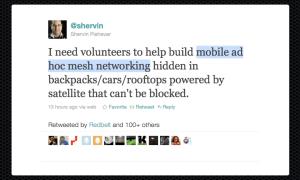Since Tuesday’s “day of rage” swelled protests across Egypt, seven people have been killed, thousands have clashed with police and the country is in the middle of an Internet blackout.
(More on TIME: Did Egypt Really “Shut Off” The Internet?)
We heard of a social network ban nation wide earlier this week, as sites like Twitter, Facebook and even Gmail were blocked from the country’s network to some effect, though third-party apps and platforms still allowed users access to their feeds. That changed early this morning as reports of a complete web outage surfaced around 12:30 a.m. local time. An AP report indicates that despite massive outages, Egypt’s military facilities still have Internet access (of course), but that the rest of the country remains in the dark.

How did it happen? Egypt’s governmental already exercises heavy control over national Internet service, supplied by a only handful of providers compared to the hundreds (maybe even thousands) of providers here in the U.S. See the difference? When a government like Egypt’s decides it wants to pull the plug, it can do just that almost simultaneously because of the small number of ISPs – a task that would be entirely impossible in the U.S.
Still, the collective Internet body has rallied all week in support of the Egyptian protesters, providing routes around blockages and proxy service, even continuing their battle after this morning’s outage. Currently, European HAM radio operators are being recruited to set up a alternative communication system for protesters, since most mobile networks have been blocked from providing SMS services. (Mobile operator Vodafone confirmed it was told to suspend service in parts of Egypt on Friday and agreed to comply, according to Reuters.)
(More on TIME: Photos Of Demonstrations In Cairo)
Some long-term solutions have also been set into motion by people like tech entrepreneur Shervin Pishevar, who put a call out on Twitter yesterday searching for volunteers to help construct self-configuring mobile ad hoc networks (unblockable) to prevent government caused blackouts during future protests worldwide. Those interested can reach him by tweeting @Shervin.

